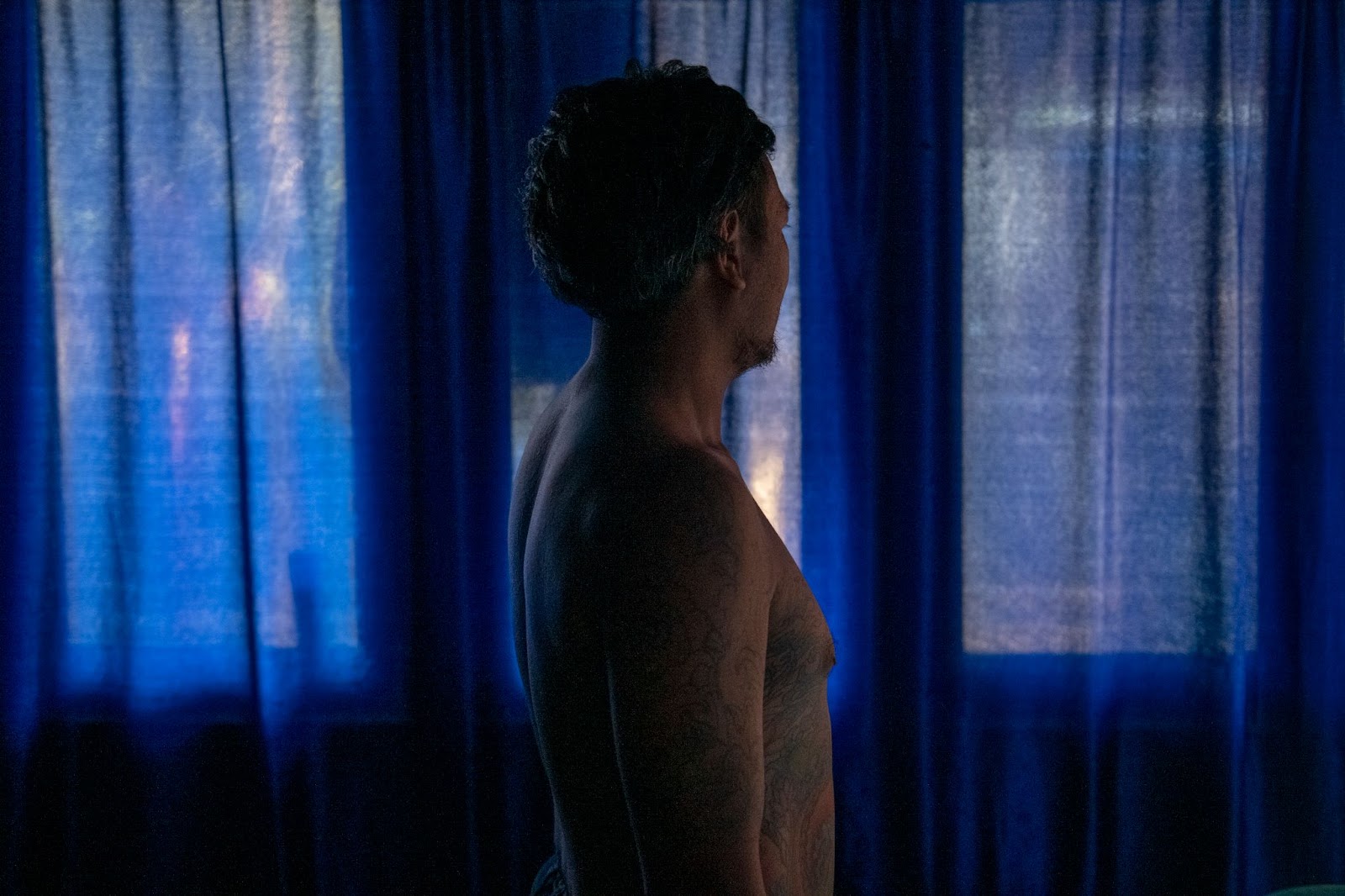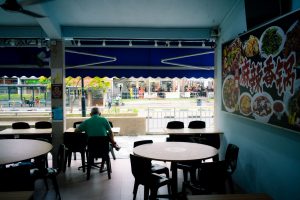Top image: Sorn, pictured in his home on the outskirts of Bangkok.
All images: Rice Media Thailand
THAILAND — June* sits on the floor of a small and crowded room her parents share. Behind her, lined up high on the longest wall, are portraits of His Majesty King Rama 9; under his gaze sits June’s father and her mother. Across from them is a door that leads to her nephew’s small room, where the quiet 17-year-old is slowly preparing to start his day.
One family member is missing from this family portrait—Aof*. The 37-year-old is June’s younger brother and the youngest child in the family. Her eyes light up as she describes her brother, and she can barely finish a sentence without her mother interrupting to make sure that no details of her son’s upstanding character are left out.
“Aof was a hardworking, high-achieving student, often at the top of his class,” June begins. She continues to tell us how Aof would later go on to make jewellery and excel at his craft. Initially, it’s difficult to reconcile their description of the bright, hardworking and caring young man, who used to lead stray cats and dogs home to feed, with the reason he’s not here today.
For the past 7.5 years, Aof has been in prison, serving a 25 years sentence that started in 2014.
Thailand’s incarceration rate
After their parents’ small retail business went bankrupt, the family had to downsize their home renting two small flats on the outskirts of Nakhon Pathom. It was during this time that Aof got involved with drugs.
“He was a good person, always working and responsible with his family,” June says, “but he was very close to his friends, and when they started to hang out and do drugs, he became an addict”.
Shortly afterwards, Aof began moving drugs for a local dealer and saw this as an opportunity to earn extra income and as an avenue to get the family back to the middle-class life they previously enjoyed.
As the only male amongst the family’s children, it’s easy to see now how Aof could make such a mistake; he felt responsible for getting the family back the comforts they previously had.
It was a mistake he would pay dearly for, with a judge deciding that Aof’s debt to society was worth over two decades of the young man’s life.
“I don’t remember anything after hearing the judge say 25 years,” June recalls the day in court. She certainly didn’t think that such a long sentence was fair; despite his cooperation with authorities and pleading guilty to the charges brought against him, the judge had sentenced Aof to 2.5 decades in prison at the age of 30.
Aof’s father was most affected by the sentence; he quickly became withdrawn after returning home. “Now he wanders the neighbourhood alone during the day,” June says.
Aof’s sentence, while harsh and unrelenting, fits the reputation that Thailand’s justice system has carved for itself. It’s an approach that has earned Thailand the top spot amongst its regional neighbours with the highest prison population in Southeast Asia.
Specifically, with regards to drug trafficking, decades-long sentences are common, and guilty parties can find themselves sentenced to life or even condemned to death depending on the volume and type of drugs they are caught moving.
According to iLaw (Internet for People’s Law Project), a non-government organisation focusing on civil rights and freedoms, 72% of Thailand’s prison population is serving time for drug offences. Furthermore, World Prison Brief—an online database that collects and categorises data into a prison profile for each country—lists Thailand’s prison population at 411 per 100,000 citizens. This ‘prison population rate’ is a commonly used metric to determine how many individuals are incarcerated relative to the country’s total population.
With 411 per 100,000 citizens incarcerated, Thailand has the 11th highest incarceration rate in the world according to World Prison Brief’s latest data; the world’s number one incarcerator is the United States, with 629 prisoners per 100,000 citizens.
The Royal Pardon
After Aof’s sentencing, his family quickly started learning how to navigate the various legal avenues open to him to secure his release. June began studying law in her spare time to understand better the justice system and how she could bring her brother home.
One of the first ways she learned her brother’s sentence could be reduced would quickly become the primary hope that she and her family held for her brother’s early release. It is an avenue that is not widely known about or discussed, but one that sets Thailand’s justice system apart from its regional neighbours: the Royal Pardon initiative.
For those incarcerated, Thailand’s Royal Pardon offers a chance of early release that prisoners can qualify for by demonstrating rehabilitative behaviour and progressing through programs and initiatives offered to them.
According to Thailand’s Department of Corrections website, the Royal Pardon is “granted as a matter of routine procedure” and typically announced twice a year: once on His Majesty the King’s Rama 10’s birthday on July 28th and once again on Father’s Day, which falls on the late Majesty Rama 9’s birthday on December 5th.
Prisoners and concerned persons may “petition his Majesty the King… by submitting such petition through official channels” according to information listed on the Department of Corrections website, which also states that the process and outcome are not guaranteed and is “subject to the King’s discretion based on the recommendation submitted by the Minister of Justice“.
By receiving a Royal Pardon, prisoners can reduce their sentences or even secure an early release. Still, beyond the individual benefits, the program also helps to relieve an overburdened and overcrowded prison system.
Prisoners who receive a Royal Pardon often have any fines or financial reparations charged against them waived first. Those who spoke to Rice told us that it isn’t until subsequent pardons are granted that years of a sentence are reduced. That reduction can be up to 1/6th of the initial sentence—a 25-year sentence can be reduced to between 3-5 years with just one fell swoop of a pardon.
Pardons by His Majesty the King are often granted en masse. In July 2021 the Bangkok Post reported that more than 200,000 individuals incarcerated throughout Thailand received a Royal Pardon on the occasion of His Majesty’s 69th Birthday. Thirty-five thousand would eventually be granted parole.
Most recently, 138,175 prisoners received a Royal Pardon on the occasion of the late King Bhumibol Adulyadej’s birthday in early December. Of those, almost half had been granted early release.
Royal Efforts
To secure a pardon or early release, prisoners are required to complete a training program called ‘Khok Nong Na’, an agricultural programme that teaches prisoners how to work and care for the land. It’s a training regime based on the New Theory of Agriculture and the Sufficiency Economy philosophy enacted by the late King Bhumibol Adulyadej.
One individual who has participated in and benefitted from the pardon program is Sorn*, a 39-year-old sound engineer who would earn his release after receiving multiple Royal Pardons. Sitting in the living room of his home on the outskirts of Bangkok, he speaks openly and candidly about the circumstances leading up to his incarceration.
“Students were fighting and shooting in the street, and they tried to come through the yard to get to another one’s house,” Sorn tells us, describing an altercation in his neighbourhood between feuding groups of vocational students that spilt over into his front yard endangering both him and his young nephew.
The feud eventually ended with Sorn being charged for causing the death of a young vocational student.
Despite his self-defence argument, his involvement saw him convicted and sentenced to 25 years in prison—10 years for murder with intent and 15 years for attempted murder. Faced with a 25-year sentence, Sorn considered himself lucky.
“Usually, for convictions similar to mine, life in prison or even the death penalty is common; I only got 25 years,” Sorn intones.
The mindset of being fortunate, along with a strong spirit, was what kept Sorn going when he arrived at the prison after sentencing. The first month, he says, was the most challenging time of his entire sentence.
“The first month, you aren’t allowed to do anything,” says Sorn. “Prisoners are only permitted to participate in work and training programs after this first month. While waiting for the month to pass, I could only leave the 60-men cell to eat and shower.”
According to Sorn, the cell was so crowded that men would often sleep shoulder-shoulder or with legs intertwined due to lack of floor space. “In those first days, I couldn’t eat, sleep or go to the toilet.”
It wasn’t until the first month had passed that Sorn would be asked for his specialisation or profession pre-incarceration. Prison officials use this information of the skills prisoners may already have to determine what work programs they would be best suited.
As an audio event manager prior to his incarceration, Sorn was assigned to work in the prison’s AV department, helping prepare for presentations and performances on different events and occasions in the prison. Once permitted to work, Sorn says it was much easier to find a routine.
It also meant that he would change cell blocks. After starting work, he soon found himself sharing a less crowded cell with 24 other men before finally settling into his semi-permanent cell at Khlong Prem Central Prison, where he shared the space with but nine other prisoners.
“Kee Kook”
As difficult as the ordeal sounds inside, it would be just as difficult for those on the outside, and Sorn reiterates what many have said about the broader effects of incarceration.
“When she first visited me, she wanted to take my place,” Sorn shares how his mother felt in the early months of his imprisonment. “She would visit every day she was able.”
He remembers feeling like he had let his family down by being incarcerated and unable to support them. This is in addition to the social stigma surrounding a family member’s incarceration that is very commonly experienced by those who have a loved one inside.
The difficulty he saw his friends and family go through motivated Sorn to participate in the projects and programs inside.
“People are labelled as “Kee Kook” (criminal/crook) once they’ve been to prison, and it doesn’t help their rehabilitation,” Sorn adds. “It’s why so many people want to stay in prison because life is too hard for them outside.”
Still, despite the obstacles, Sorn kept busy with the prison programs. “The programs are there for people to make good use of their time and to change their perspective and behaviour.”
This perspective and change in behaviour eventually led to Sorn receiving his first Royal Pardon. Initially, however, he was disappointed to learn that instead of receiving seven years off his sentence, he would receive only a 5-year reduction. That spurred him to participate earnestly and patiently in the programs.
Sorn would go on to receive a total of five Royal Pardons which led to his early release in late 2020 after serving just eight years of his initial 25-year sentence.
“In prison, my life was frozen for eight years,” Sorn recalls. That long sentence gave him time to reflect on his life and eventually form a new perspective. This new perspective, along with his strong spirit, gave him the willingness to change.
The Royal Pardon is not for everyone
Still, prisoners serving a shorter sentence, he says, are not likely to have the same mindset. “Nobody will change if they’re serving five years or less,” he explains. “The true change comes from those serving longer sentences.”
According to Sorn, individuals serving shorter sentences are more likely to re-offend as there is no incentive to change when they are in prison for such a short time. With no incentive, there’s little willpower, which leads to recidivism. According to Thailand’s Department of Corrections website, which publishes data on rates of recidivism in Thailand, 2020 saw recidivism rates between 12-16% amongst male prisoners in a one-year period following their release.
Sorn’s opinions on the likelihood for change in some prisoners have been loosely echoed by Thailand’s Department of Corrections Director-General Mr Aryut Sinthopphan.
Last year when asked about who is eligible for release through the Royal Pardon program, Mr Aryut said that those who have not behaved well or have not shown progress towards rehabilitation during their sentence are not eligible to receive a Royal Pardon.
This is in addition to individuals convicted in major drug cases, those sentenced to death who have already been granted a royal reprieve, and those who have been imprisoned repeatedly for reoffending.
This policy seems to follow public sentiment on pardons and, more specifically, who receives them. A public poll conducted by NIDA in December 2021 found that the majority of respondents opposed Royal Pardons being granted to convicted corrupt individuals, those sentenced for serious offences like rape and murder, and those who were convicted of drug trafficking.
When he was eventually released, Sorn says the feeling was bittersweet. He was happy to be free, but part of him also cherished the connections he made in prison. “When I was in prison, I gave advice to the younger men who came in,” he shares. “Now, we only keep in contact through letters.”
Still, maintaining those connections are important, says Sorn, who now tries to help those in prison when they get out by offering them jobs and helping them get back on their feet.
“It’s easy to get into prison, but it’s harder to get out,” says Sorn. Still, even after serving his sentence and paying his debt to society, Sorn tells us he does not see any benefit from sending someone to prison. “You lose time, you lose your life and most importantly, you lose your family.”
Aof’s Royal Pardon journey
Back in Nakhon Pathom, June tells us that her brother, Aof, quickly began using his time inside to better himself and worked diligently to receive as many pardons as possible. The aim is to reduce his sentence by as many years as possible.
Like Sorn, the programs and rehabilitative opportunities during his incarceration have given Aof something to work towards, and, just as he did in his life before prison, he has excelled. Since he started his sentence 7.5 years ago, Aof has earned certificates from programs including computer studies and satellite installation and has received seven Royal Pardons for good behaviour and rehabilitation.
These reprieves have significantly reduced his initial 25-year sentence—his family is hopeful he could be released as early as 2022. But first, he will need to complete the compulsory ‘Khok Nong Na’ agriculture programme to secure his eligibility for release.
Offering proof of her brother’s good nature, June opens a nearby drawer in her parents’ room and spreads dozens of colourful pink envelopes on the floor. The envelopes contain letters Aof has sent to the family from prison. “When he sends us letters,” June tells us, “he includes messages to give to the families of other prisoners who cannot write”.
One postcard stands out from the collection. It is marked with a stamp bearing a portrait of His Majesty King Rama 9 and was used to schedule visits at the prison before the Covid-19 pandemic halted in-person visitation. Today, the family crowds a small screen during the 10 minutes of video visitation with Aof each week.
Separately, June shows us a short video on her phone, a compilation of video messages and good wishes from family members to send to Aof for New Years Day. While June says she and her family miss visiting Aof in person, they are grateful that they can visit him virtually through video calls each week.
Good people make mistakes
The difficulties associated with maintaining contact through visits and video calls are just one of the hardships of having an incarcerated family member. Aof’s mother tells us she had never cared or thought much about incarceration or the justice system in general before Aof was sentenced, but she thinks about it differently now.
She shared that the effect on family connections and relationships is not often considered when people think of crime and punishment and, more importantly, when sentences are handed down.
June says her family is grateful for the pardons Aof has received, but they say they still don’t understand why such heavy and harsh sentences are so common.
“Fifteen years would be more appropriate, but not 25,” June protests. This is especially true given Aof’s lack of previous convictions and cooperation with authorities following his arrest. Initially, the 25-year sentence left June and her parents with little hope that their family would be complete again. It wasn’t until they learned of the Royal Pardon program that they began to hope for a reprieve. For them, the Royal Pardon program has recognised what they knew all along: that Aof is a good person who had the misfortune of making a mistake.
Despite making a mistake that cost him and his family dearly, June still takes every opportunity to speak highly of her brother.
“[Aof] has always been a smart person… and was always polite. His bosses and colleagues loved him,” June says. “Good people like Aof make mistakes, but that mistake shouldn’t define them.”







